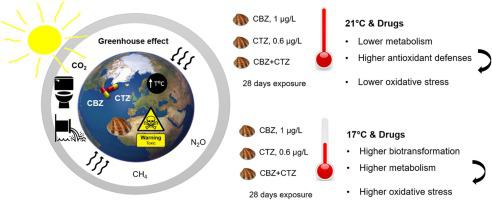Aquatic Toxicology ( IF 4.5 ) Pub Date : 2020-11-02 , DOI: 10.1016/j.aquatox.2020.105673 Ângela Almeida , Vânia Calisto , Valdemar I. Esteves , Rudolf J. Schneider , Etelvina Figueira , Amadeu M.V.M. Soares , Rosa Freitas

|
The negative effects induced in marine organisms by Climate Change related abiotic factors consequences, namely ocean warming, are well-known. However, few works studied the combined impacts of ocean warming and contaminants, as pharmaceutical drugs. Carbamazepine (CBZ) and cetirizine (CTZ) occur in the marine environment, showing negative effects in marine organisms. This study aimed to evaluate the impacts of ocean warming on the effects of CBZ and CTZ, when acting individually and combined (drug vs drug), in the edible clam Ruditapes philippinarum. For that, drugs concentration, bioconcentration factors and biochemical parameters, related with clam’s metabolic capacity and oxidative stress, were evaluated after 28 days exposure to environmentally relevant scenarios of these stressors. The results showed limited impacts of the drugs (single and combined) at control and warming condition. Indeed, it appeared that warming improved the oxidative status of contaminated clams (higher reduced to oxidized glutathione ratio, lower lipid peroxidation and protein carbonylation levels), especially when both drugs were combined. This may result from clam’s defence mechanisms activation and reduced metabolic capacity that, respectively, increased elimination and limited production of reactive oxygen species. At low stress levels, defence mechanisms were not activated which resulted into oxidative stress. The present findings highlighted that under higher stress levels clams may be able to activate defence strategies that were sufficient to avoid cellular damages and loss of redox homeostasis. Nevertheless, low concentrations were tested in the present study and the observed responses may greatly change under increased pollution levels or temperatures. Further research on this topic is needed since marine heat waves are increasing in frequency and intensity and pollution levels of some pharmaceuticals are also increasing in coastal systems.
中文翻译:

海洋变暖是否可以改变海洋双壳类中抗癫痫药和抗组胺药的亚致死作用?
众所周知,与气候变化有关的非生物因素后果对海洋生物造成的负面影响,即海洋变暖。但是,很少有研究研究海洋变暖和污染物作为药物的综合影响。卡马西平(CBZ)和西替利嗪(CTZ)发生在海洋环境中,对海洋生物产生不利影响。这项研究旨在评估可食用蛤仔菲律宾蛤单独或联合(药物与药物)作用时海洋变暖对CBZ和CTZ的影响。。因此,与蛤的代谢能力和氧化应激有关的药物浓度,生物浓缩因子和生化参数在暴露于这些应激源与环境相关的情况下28天后进行了评估。结果表明,在控制和加温条件下,这些药物(单一和组合)的影响有限。确实,升温似乎改善了被污染蛤的氧化状态(氧化谷胱甘肽比率降低得更高,脂质过氧化作用和蛋白质羰基化水平降低),特别是当两种药物组合使用时。这可能是由于蛤s的防御机制激活和代谢能力降低而引起的,而代谢能力的降低分别增加了活性氧的消除和限制。在低压力水平下,防御机制未激活,导致氧化应激。本研究结果强调,在较高的应激水平下,蛤可能能够激活足以避免细胞损伤和氧化还原稳态失去的防御策略。然而,在本研究中测试了低浓度,并且观察到的响应在污染水平或温度升高时可能会发生很大变化。由于海洋热浪的频率和强度都在增加,而且沿海地区某些药物的污染水平也在增加,因此需要对该主题进行进一步的研究。在本研究中测试了低浓度,在增加的污染水平或温度下,观察到的响应可能会发生很大变化。由于海洋热浪的频率和强度都在增加,而且沿海地区某些药物的污染水平也在增加,因此需要对该主题进行进一步的研究。在本研究中测试了低浓度,在增加的污染水平或温度下,观察到的响应可能会发生很大变化。由于海洋热浪的频率和强度都在增加,而且沿海地区某些药物的污染水平也在增加,因此需要对该主题进行进一步的研究。



























 京公网安备 11010802027423号
京公网安备 11010802027423号